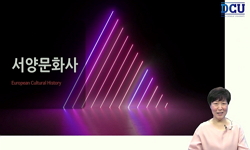The two years 2009~2010 of the Korean world of western history experienced the visible slowdown of the rapidly growing trend which appeared during the previous several years in quantitative achievement, and the deepening and specialization of existing...
http://chineseinput.net/에서 pinyin(병음)방식으로 중국어를 변환할 수 있습니다.
변환된 중국어를 복사하여 사용하시면 됩니다.
- 中文 을 입력하시려면 zhongwen을 입력하시고 space를누르시면됩니다.
- 北京 을 입력하시려면 beijing을 입력하시고 space를 누르시면 됩니다.
https://www.riss.kr/link?id=A60134481
- 저자
- 발행기관
- 학술지명
- 권호사항
-
발행연도
2011
-
작성언어
Korean
- 주제어
-
등재정보
KCI우수등재
-
자료형태
학술저널
-
수록면
141-157(17쪽)
- 제공처
- 소장기관
-
0
상세조회 -
0
다운로드
부가정보
다국어 초록 (Multilingual Abstract)
The perceptible tendencies characteristic of the past two years in western history research can be sorted out in three categories. First, classical historical study such as political history, social history, intellectual history and history of thought extended its own boundary by appropriating the various trends of ‘new history’ while maintaining the traditional methods. Second, cultural history(‘culture’ in its broad anthropological sens) came to have the wide range of case studies like women, gender, cult of heros, religious sensitivity, daily life and generation. Finally, history of every period and country, especially German history and British history was under the current stormy influence of a categorical series of ‘transnational history’ such as Eurocentrism, immigration, memory, global history and environmental history. In sum, Korean scholars of western history for the last two years made a lot of efforts to extend and tamp the Korean territory of western history.
However, we are faced with the imminent problem of sharp decrease in the recruitment of young scholars to continue the present active research capacities and to explore the ignored fields, which remains an urgent task to be overcome.
The two years 2009~2010 of the Korean world of western history experienced the visible slowdown of the rapidly growing trend which appeared during the previous several years in quantitative achievement, and the deepening and specialization of existing various themes in qualitative evaluation, all of which can be abbreviated as ‘a territorial consolidation’ of the Korean western history.
The perceptible tendencies characteristic of the past two years in western history research can be sorted out in three categories. First, classical historical study such as political history, social history, intellectual history and history of thought extended its own boundary by appropriating the various trends of ‘new history’ while maintaining the traditional methods. Second, cultural history(‘culture’ in its broad anthropological sens) came to have the wide range of case studies like women, gender, cult of heros, religious sensitivity, daily life and generation. Finally, history of every period and country, especially German history and British history was under the current stormy influence of a categorical series of ‘transnational history’ such as Eurocentrism, immigration, memory, global history and environmental history. In sum, Korean scholars of western history for the last two years made a lot of efforts to extend and tamp the Korean territory of western history.
However, we are faced with the imminent problem of sharp decrease in the recruitment of young scholars to continue the present active research capacities and to explore the ignored fields, which remains an urgent task to be overcome.
목차 (Table of Contents)
- Ⅰ. 머리말
- Ⅱ. 시대·국가(지역)별 연구 경향
- Ⅲ. 주제별 연구 경향
- Ⅳ. 전망과 과제
- Abstract
- Ⅰ. 머리말
- Ⅱ. 시대·국가(지역)별 연구 경향
- Ⅲ. 주제별 연구 경향
- Ⅳ. 전망과 과제
- Abstract
동일학술지(권/호) 다른 논문
-
- 역사학회
- 설혜심(Sul, Hea-sim)
- 2011
- KCI우수등재
-
- 역사학회
- 여호규(Yeo, Ho-kyu)
- 2011
- KCI우수등재
-
- 역사학회
- 황동하(Hwang, Dong-ha)
- 2011
- KCI우수등재
-
- 역사학회
- 서영건(Seo, Young-keon)
- 2011
- KCI우수등재





 DBpia
DBpia







